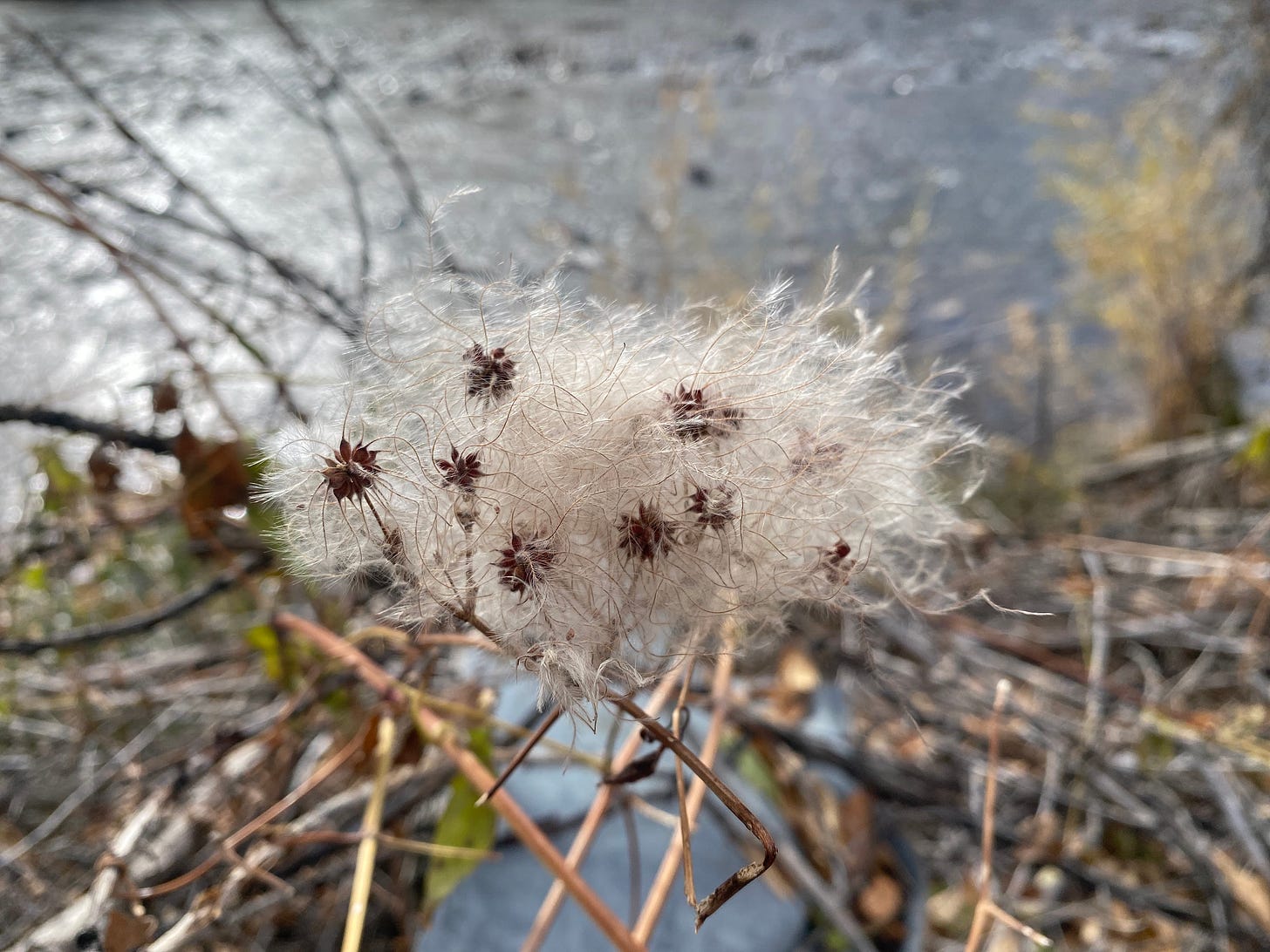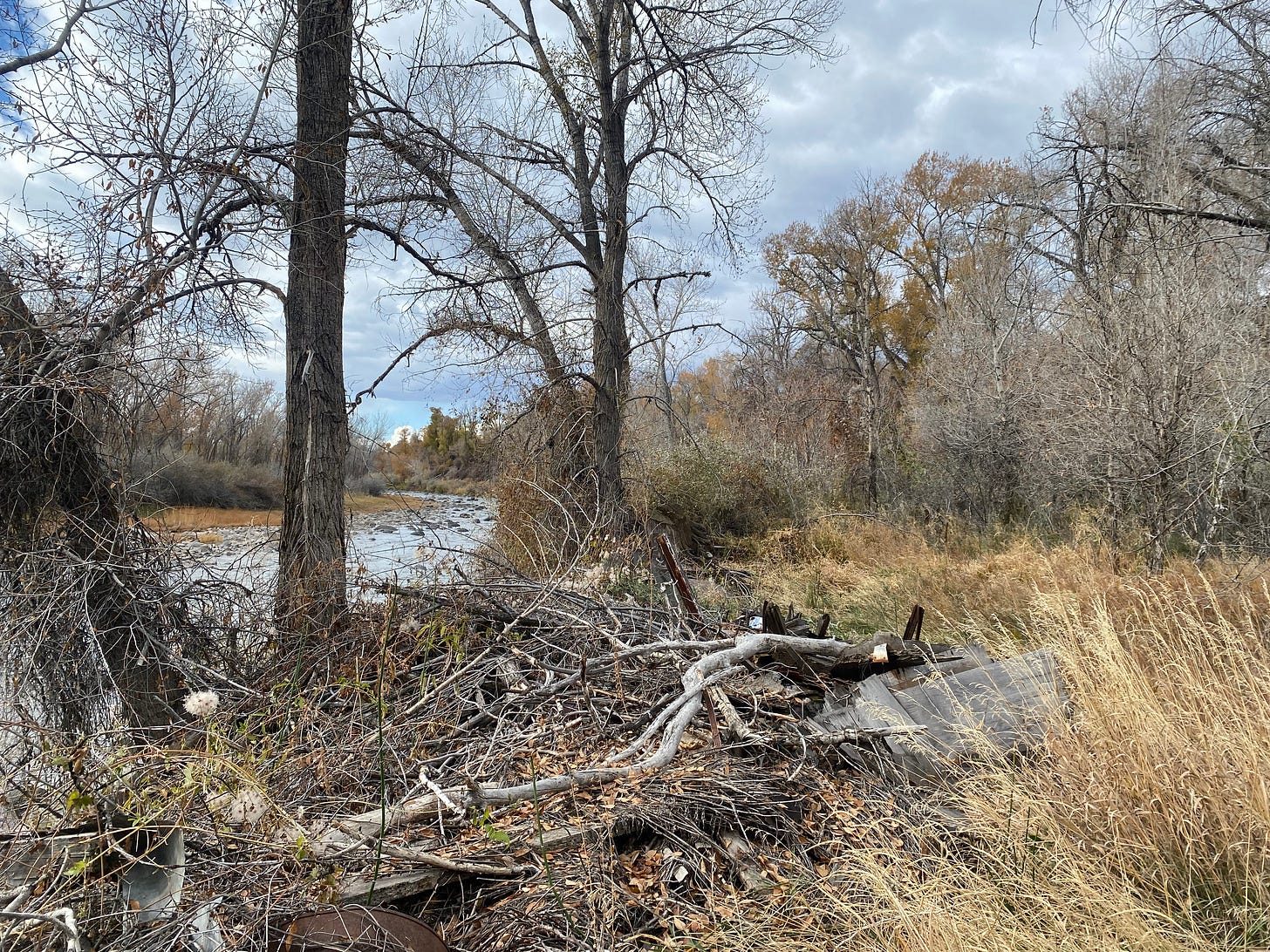trust the path the river must take
ou can set my house on fire, baby you can turn it into cinder and smoke
I walk along the river this morning with my coffee. The momentary early morning sunlight is quickly shaded by incoming rain and snow clouds. The wind whips through deadened grasses and cattails that skirt the shoreline against deep ponds that are left from long ago flooding pulses before the river was channelized so deeply. I get to the place where the spring bursts forth from the earth, yes, I’m parking my trailer right now somewhere a spring flows into the river, in the southwest, not a common thing compared to where I lived for years in Appalachia. I look across the river from this spring, its mini shores dotted with colonies of watercress.
Across the river from this gurgling spring is the shoreline I screamed on three falls ago almost exactly, where the ice formed around in the shallow pools of exposed rocks. I screamed and wailed from grief and distress, after my then ex-partner said some things to me that were hurtful, yet again, and even though split up, and trying to mend as friends with them having another partner, there was so much complexity at the time to our connection. And I guess these complexities don’t ever go away sometimes. That shoreline holds a somatic memory, the one I stare across to, it holds my heart and my hurt, my love and my loneliness. The scattered and rounded rocks draw the shape of my throbbing pained body, the tufts of grass islands paint the contours of missing my best friend, the Sheperdia Buffaloberry icy blue and still clinging to leaves juts out in the air with its opposite growing branches in the space of missing the family once felt, The cottonwood leaves yellow and rotting on the ground paint the color of the collaborative vision we had and the fallen branches of fast growing Narrowleaf and Fremont cottonwood criss cross over the terrain of the constant laughter we used to share.
And yet, it takes an evolving form.
I taught my first field ecology class through the non-profit I worked with for two years, right on that shoreline. I slept along it on the ground for the class, under a Shade Cloud canvas tarp structure, in early spring with the river roaring loud and fierce from snowmelt. Morels popped up along the shore, under the canopy of the big Cottonwoods, practically around my bedroll. The various brassicas flowered purple and white and yellow along the sand and rock of the varied flood plain zones that don’t get flooded anymore. Clematis, Poison Ivy were starting to leaf out on their winding vines. During the class we walked that river plain to study its textures, its stories, what it symbolizes in our greater cultural relationship to water and rivers. We made a fire by the shoreline where I formerly screamed, we shared tears and grief and stories and made Dogbane cordage with fibers harvested nearby. The river takes many forms, it pulses different shapes, and with our attempt to control it, the body of the river and all of its somatic imprints on the life around it is stunted and choked.
By grasping to try to make and mold someone into what we want them to be for us, we are treating them like our culture treats the river - as something that cannot morph and move and pulse. The river is still there, but it ‘never looks the same way twice’ as Heraclitus once said, communicating the way a river shows us the realtime impermanence of all things, and yet the Thing-ness of these embodied beings at the same time. The river is still a being, a river, but also it never looks the same way twice. The human who steps in it is never the same human either.
We can expand the meanings of yes and no when we really allow them to paint contours and boundaries, when we really allow them to actually mean something. Trying to make a yes a no or a no a yes, is only working against so called ‘nature’ and prolongs the capacity for the natural flow to find its way. It’s a hard lesson to learn. How can we trust the river to act with its own intelligence, move its body this way or that when it needs - constrict here or expand there? How as humans are we allowed or not to breathe like this, and how do we potentially impose this overbearing ‘Apollonian’ sentiment (a Nietzsche, reference here) on the people we claim to love? I’ve had to learn my own lessons in this. My tears and and shoreline scream were my attachment to wanting someone I loved to stay the same, to stay close to me in some way, when they needed to figure out things with distance from me. It also reflected at the same time my inability as a child to carve clear separateness for myself from my family and the dysfunction there, from others around me that would violate my no.
To quote the larger meaning behind the whole duality discussed by Nietzsche in his and others’ work exploring the Apollonian and Dionysian energies of our worlds from wikipedia, and to contextualize those energies in the meaning of what I discuss here:
Nietzsche found in classical Athenian tragedy an art form that transcended the pessimism found in the so-called wisdom of Silenus. The Greek spectators, by looking into the abyss of human suffering depicted by characters on stage, passionately and joyously affirmed life, finding it worth living. The main theme in The Birth of Tragedy is that the fusion of Dionysian and Apollonian Kunsttriebe ("artistic impulses") forms dramatic arts or tragedies. He argued that this fusion has not been achieved since the ancient Greek tragedians. Apollo represents harmony, progress, clarity, logic and the principle of individuation, whereas Dionysus represents disorder, intoxication, emotion, ecstasy and unity (hence the omission of the principle of individuation). Nietzsche used these two forces because, for him, the world of mind and order on one side, and passion and chaos on the other, formed principles that were fundamental to the Greek culture:[3][4] the Apollonian a dreaming state, full of illusions; and Dionysian a state of intoxication, representing the liberations of instinct and dissolution of boundaries. In this mould, a man appears as the satyr. He is the horror of the annihilation of the principle of individuality and at the same time someone who delights in its destruction.[5]
The opposing forces, if you want to set them opposite one another, represent the larger push and pull that we dance with in modern times, or perhaps, in general. One of these forces isn’t necessarily bad or good, but with one out of balance, our world can feel awry.
I see the control of the river, and therefore the control we can impose on one another, as similar energies more keen to Apollonian energies out of balance. This is symbolized by the large phallic columns, representing of masculine dominance over nature, controlling the wild, the emotional and the feral, needing to oppose order, the square buildings coded for our safety, the cement lined ditches to make sure the water goes precisely where we want, The grids drawn on the desert, the food sold in boxes within boxes within boxes (and reference here to a poem I wrote in my first Ground Shots zine, some readers may have copies but I haven’t reprinted this poem in awhile) are all reflections of this Apollonian out of balance.
It is a dream to believe we can control ‘emotions’ and ‘ecstasy’ forever. Eventually this attempt to make still, individualize, or control will prove to be useless. And yet, we need both. We need boundaries and the release of boundaries. We need to assert our desires and wants without imposing them. We need to see the river as a Being without forcing it to always look like the same Being all the time. We need to see one another as fluxing states between individuals and beings that merge with a bigger flow. We are both separate entities that encompass stable patterns and yet, we each are a river with unpredictable faces, and within those faces and facets are stories held in rocks, sedges and willow groves coppiced by beavers and humans trying to reweave new myths.
I’ve been on many sides of this story, the one trying to control, and the one trying to be controlled. I’ve attempted to pin down places, garden beds, people into neat lines, and I’ve also been pushed onto ideas about who I am supposed to be, look like, how I’m supposed to express my gender, love or feel about particular things. I’ve been told my needs are too much, that I am not allowed to say no. That I owe someone yes. I’ve told others that their no is abandonment, that their no is unfair. That their need for individuation after a time of dissolving into one another, is an assault in some way.
There’s always love and growing pains to these fluxes, these expansions and contractions, and we don’t have to handle them gracefully. The flooding overflowing river pushes through and graceful isn’t always the word used when she decides to become many again. There’s often a lot of death, pain and fear.
As I walk by the river, I feel many ways at once. I feel sadness and also content. I feel joy and also sorrow. I feel lonely and yet held. We can feel many ways at once about ourselves, the river, the people around us, the ideas we hold. It doesn’t even need to be two opposing ways either, but a web of ways. We can have stories held in landscapes, like the rocks in my screams and sorrows, but also feel the joys making cordage around a fire. These can exist simultaneously at once. And more layer on top, in-between, into the past and the future yet unknown. Holding the tension of the future unknown in one hand lies togetherness and the other separation, takes some patience and releasing, trust somehow even when trust has been so sorely broken. Whatever path the river needs to take, we have to trust it must be. Whatever path others need to take, we must trust it to be.
You can set my house on fire, baby You can turn it into cinder and smoke ‘Cause this house is mighty cold And I feel like meltin’ all the snow away You see these boots I’m wearin’ They’re tough enough to go And they will take many a road to reach you Honey won’t you light the way You can set my house on fire, baby You can turn it into cinder and smoke ‘Cause this house is mighty cold And I feel like meltin’ all the snow away You see this train I’m riding It’s burnin’ up the coal And it’s wheels are bound to roll right by you Honey won’t you jump my train You can set my house on fire, baby You can turn it into cinder and smoke ‘Cause this house is mighty cold And I feel like meltin’ all the snow away You can set my house on fire baby You can turn it into cinder and smoke ‘Cause this house is mighty cold And I feel like meltin’ all the snow away You can set my house on fire, baby - Tyler Childers






